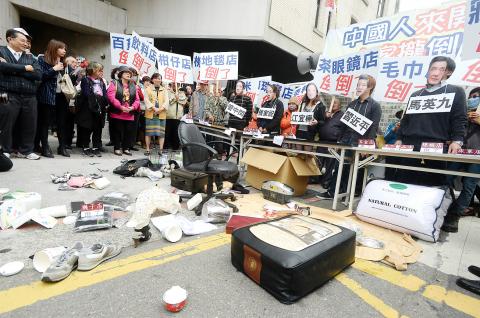Representatives from civic groups, the manufacturing and retail industries and the Taiwan Solidarity Union (TSU) yesterday voiced their strong opposition to a proposed cross-strait service trade agreement on the sidelines of a public hearing at the legislature on the agreement’s impact on local businesses.
The legislature yesterday held the 12th of 16 public hearings on the service trade pact’s potential impact on the retail and wholesale sectors mandated by a legislative resolution.
Representatives from the manufacturing and retail industry staged a protest in front of the Legislative Yuan building, demanding that the sectors be excluded from the agreement because the market opening could jeopardize local businesses and job opportunities.

Photo: Wang Yi-sung, Taipei Times
“We’re talking about the livelihoods of more than 3 million vendors, shops and small manufacturers, as well as more than 10 million employees in the industry. It would be difficult for us to compete with state-backed Chinese investors and businesses,” said Huang Kuang-yi (黃光藝), spokesperson of an alliance of local retailers and manufacturers.
The Democratic Front Against Cross-Strait Trade in Services Agreement organized a press conference outside the Legislative Yuan’s conference room, where the hearing took place, calling for a renegotiation of the agreement and more public hearings in light of new findings about the agreement.
Information from different government agencies on which sectors will be liberalized appears to be inconsistent, raising concern over possible flaws in the bilateral negotiation process, alliance spokesperson Lai Chung-chiang (賴中強) said.
For example, Taiwan is expected to liberalize commissioner agents’ services and protect franchising services under the category of distribution services, as regulated by the UN Provisional Central Product Classification (聯合國中央產品分類暫行版), according to the specific commitments listed in the agreement, he said.
However, information provided by the Ministry of Economic Affairs states that Taiwan would protect commissioner agents’ services and liberalize franchising services, he said.
“With flaws like these, we should renegotiate the agreement,” Lai said.
At a press conference held simultaneously with the hearing, TSU Legislator Hsu Chung-hsin (許忠信) said that the agreement was not reciprocal, as Taiwan will have to liberalize almost its entire retail and wholesale sectors to Chinese investment, but Beijing will not offer the same treatment to Taiwanese investors and businesses.
“China will only liberalize part of its cross-border services and commercial presence to Taiwan,” Hsu said.
Reciprocity is crucial for Taiwan’s retail and wholesale sector, which accounted for 28.6 percent of the nation’s GDP last year, he said.

The Ministry of Education (MOE) is to launch a new program to encourage international students to stay in Taiwan and explore job opportunities here after graduation, Deputy Minister of Education Yeh Ping-cheng (葉丙成) said on Friday. The government would provide full scholarships for international students to further their studies for two years in Taiwan, so those who want to pursue a master’s degree can consider applying for the program, he said. The fields included are science, technology, engineering, mathematics, semiconductors and finance, Yeh added. The program, called “Intense 2+2,” would also assist international students who completed the two years of further studies in

Former president Tsai Ing-wen (蔡英文) departed for Europe on Friday night, with planned stops in Lithuania and Denmark. Tsai arrived at Taiwan Taoyuan International Airport on Friday night, but did not speak to reporters before departing. Tsai wrote on social media later that the purpose of the trip was to reaffirm the commitment of Taiwanese to working with democratic allies to promote regional security and stability, upholding freedom and democracy, and defending their homeland. She also expressed hope that through joint efforts, Taiwan and Europe would continue to be partners building up economic resilience on the global stage. The former president was to first

Taiwan will now have four additional national holidays after the Legislative Yuan passed an amendment today, which also made Labor Day a national holiday for all sectors. The Chinese Nationalist Party (KMT) and Taiwan People’s Party (TPP) used their majority in the Legislative Yuan to pass the amendment to the Act on Implementing Memorial Days and State Holidays (紀念日及節日實施辦法), which the parties jointly proposed, in its third and final reading today. The legislature passed the bill to amend the act, which is currently enforced administratively, raising it to the legal level. The new legislation recognizes Confucius’ birthday on Sept. 28, the

MORE NEEDED: Recall drives against legislators in Miaoli’s two districts and Hsinchu’s second district were still a few thousand signatures short of the second-stage threshold Campaigners aiming to recall Chinese Nationalist Party (KMT) legislators yesterday said they expect success in 30 out of 35 districts where drives have passed the second-stage threshold, which would mark a record number of recall votes held at once. Hsinchu County recall campaigners yesterday announced that they reached the second-stage threshold in the recall effort against Legislator Lin Szu-ming (林思銘). A total of 26,414 signatures have been gathered over the past two months, surpassing the 10 percent threshold of 23,287 in Hsinchu County’s second electoral district, chief campaigner Hsieh Ting-ting (謝婷婷) said. “Our target is to gather an additional 1,500 signatures to reach